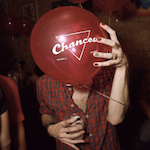Art & Art History
If I Can’t Dance, . . . : The Radical Politics Of Pleasure And Delight In Queer Spaces And Activism

Gallery 400
400 S. Peoria St.
In conjunction with the Making Chances exhibition, this panel asks presenters to consider some of the guiding principles of Chances Dances: creating inclusive queer spaces, art as activism, building temporary queer utopias, the role of pleasure in sustaining radical queerness, and how these principles apply to, are activated by, fail, or are subsumed within contemporary LGBTQIA communities and movements. Moderated by Roderick A. Ferguson, the panel includes Martin F. Manalansan IV, Jason Orne, Francesca T. Royster, and Micah Salkind. This discussion brings together scholars from across the humanities and social sciences to share their approaches and to offer a broader context for Making Chances and the work of Chances Dances as they celebrate 10 years of queer community building.
Panelist Bios:
Roderick A. Ferguson is faculty in the Department of African American Studies and Gender and Women’s Studies Program at the University of Illinois at Chicago. He is the co-director of the Racialized Body research cluster at UIC. He is the author of The Reorder of Things: The University and Its Pedagogies of Minority Difference and Aberrations in Black: Toward a Queer of Color Critique.
Francesca T. Royster is a Professor of English and Chair of the English Department at DePaul University, where she teaches courses in Critical Race Theory, Gender and Queer Theory and African American Literature, Shakespeare and Early Modern Literature. She is the author of Sounding Like a No-No: Queer Sounds and Eccentric Acts in the Post-Soul Era (University of Michigan Press, 2013), which received honorable mention for the Modern Language Association of America’s William Sanders Scarborough Prize for an Outstanding Scholarly Study of African American Literature and Culture. Her presentation Party of One will explore the space of the imagination as a “Queer” space in the context of music making spaces.
Jason Orne is a Postdoctoral Fellow at University of Wisconsin-Madison and a partner in the research firm Qualitative Health Research Consultants. He is the author of Boystown, which will be released Fall 2016 from University of Chicago Press, about the importance of sex to queer communities through a three year ethnography of Boystown and connected queer male spaces. In his presentation Sexy Communities: Carnal Sociology and Community Space, Orne will discuss the concept inclusive communities built on the pleasure of sex and sexuality and the consequences for sexy communities in terms of racial diversity and what happens when they leave “gay” neighborhoods like Boystown.
Micah Salkind is Ph.D candidate in American Studies at Brown University. His writing on Afro-Diasporic cultural production and post-industrial cultural development complements his work towards establishing innovative models for sustaining community art institutions and art-makers in Providence, RI and Chicago, IL. Salkind’s presentation will focus on the connections between DIY Black and Latino punk traditions, Chicago house music history, and the development of Chances Dances.
Martin F. Manalansan IV is Associate Professor of Anthropology and Asian American Studies and a Conrad Professorial Humanities Scholar at the University of Illinois, Urbana-Champaign. His current book projects include the ethical and embodied dimensions of the lives and struggles of undocumented queer immigrants, Asian American immigrant culinary cultures, sensory and affective dimensions of race and difference, and Filipino return migration. His presentation, Once Upon A Time: Fairies, Fairytales and the Fabulous in Queer Immigrant New York, looks at the routines and lives of undocumented Asian and Latino queers, and takes the ideas of fabulous and fabulosity as messy narratives of worlds and selves that traipse along the shifting borders between exuberance and pathos.
This program is co-sponsored by the Department of Gender & Women’s Studies and the Gender and Sexuality Center at UIC and made possible in part by a grant from the Illinois Humanities, the National Endowment for the Humanities, and the Illinois General Assembly.